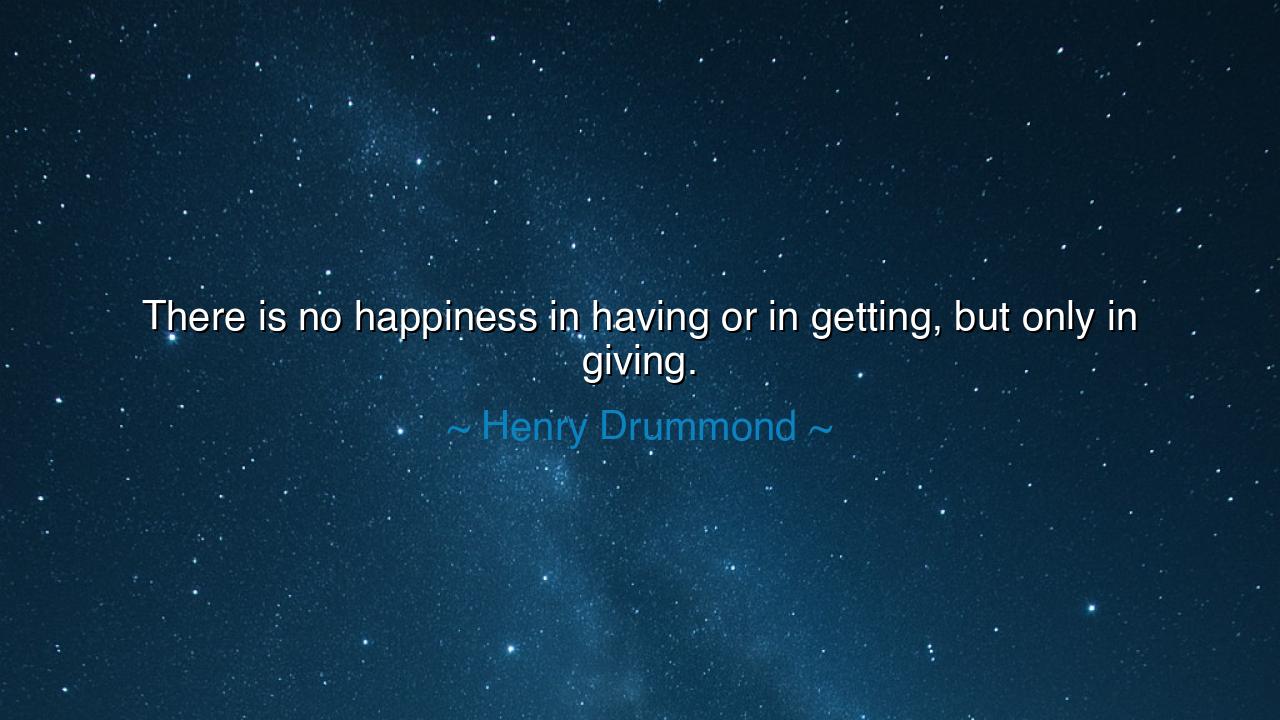
There is no happiness in having or in getting, but only in






“There is no happiness in having or in getting, but only in giving.” Thus spoke Henry Drummond, the Scottish writer, preacher, and naturalist whose heart sought to reconcile science with the soul, and intellect with love. In this brief yet eternal truth, he captures the essence of what the ancients, the prophets, and the saints have long proclaimed: that happiness is not found in possession, but in generosity; not in the grasping of the hand, but in its opening. To have is fleeting, to get is empty — but to give, ah, that is to partake in the divine rhythm of creation itself.
Drummond’s words are not born of naïve sentiment, but of observation and spiritual wisdom. He lived in an age of growing wealth and industrial ambition, when men measured success by having and getting, by accumulation and power. Yet he saw that such wealth, though vast, did not bring peace. The human soul, he realized, is a vessel that cannot be filled from without. You may heap treasures upon it — gold, comfort, applause — and still it will hunger. But when that same soul pours itself out in giving, it ceases to hunger and begins to shine. For giving transforms the heart; it releases the self from the tyranny of selfhood.
To understand this mystery, one must look not to theory but to life. Consider Mother Teresa of Calcutta, who walked among the poorest of the poor, empty-handed, yet overflowing with joy. She owned almost nothing, yet possessed a peace that kings could not buy. When asked how she could smile amidst so much suffering, she replied, “It is not how much we give, but how much love we put into giving.” In her, the truth of Drummond’s words became flesh: happiness dwells not in what is held, but in what is given away. Her life was proof that giving is not loss, but abundance multiplied.
Drummond, like the sages before him, saw that the world deceives men with a false promise — that getting brings joy. It whispers: acquire more, and you will be content. Yet the more one gathers, the emptier one becomes. This is the ancient paradox of the soul: the hands that cling to possessions grow tired, but the hands that serve grow strong. The man who seeks to take from life ends by losing it; the one who gives to life becomes eternal. Thus, giving is not merely a moral duty — it is the secret to lasting happiness, the law of spiritual vitality.
The ancients knew this truth. In the temples of old Greece, it was said that “to give is divine,” for even the gods were imagined as those who poured blessings upon humankind. In the East, the Buddha taught that the joy of the wise is found in selflessness, in acts of compassion that dissolve the illusion of separation. And in the teachings of Christ, which Drummond often expounded, we hear the same echo: “It is more blessed to give than to receive.” These are not differing doctrines but one eternal voice, speaking through ages and tongues — that love expressed through giving is the highest form of existence.
Yet giving is not confined to wealth or charity. To give is to live — to offer kindness where there is bitterness, patience where there is anger, understanding where there is confusion. One may give a smile, a word of comfort, a moment of listening — and by such small acts, restore the dignity of another’s soul. The one who gives in this way lives abundantly, for every act of generosity enlarges the heart. The measure of a life, therefore, is not in what it owns, but in what it has given to the world — in joy, in service, in love.
Let this then be the lesson for those who seek peace in a restless age: give. When the hunger for possession arises, answer it with compassion. When fear of loss grips you, loosen your grasp and share what you have. Give of your time, your attention, your heart — for the wealth of the spirit increases not by saving, but by spending itself in love. In the economy of the soul, what you give away is the only treasure you truly keep.
Thus, Henry Drummond speaks as one of the eternal teachers of mankind. Happiness, he tells us, is not the fruit of acquisition, but the fragrance of giving. The rich man who hoards dies poor; the humble giver dies fulfilled. So, my child, if you would know peace, do not seek to have, but to give. Let your life become an offering — for in the act of giving, you will find the secret that kings and scholars have sought since the dawn of time: that the heart that gives freely, gives forever, and in that giving, becomes whole.






AAdministratorAdministrator
Welcome, honored guests. Please leave a comment, we will respond soon